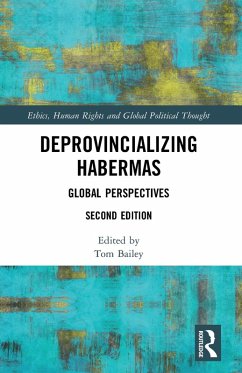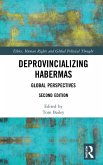This book provides a rich and systematic engagement with Jürgen Habermas' political theory from critical perspectives outside its Western locus. It constructively examines the theory's implications for non-'Western' contexts ranging from Latin America and the Middle East to India and China, and for themes ranging from cosmopolitanism, democracy and human rights to colonialism, feminism, care, modernity, and religion. The chapters added to the second edition explore Habermas' own recent response to the charge of 'provincialism'.
The book will be of special interest to scholars and students of political theory, global justice, international affairs, philosophy, and critical theory, and also to those working in postcolonial studies, religious studies, sociology and cultural studies.
The book will be of special interest to scholars and students of political theory, global justice, international affairs, philosophy, and critical theory, and also to those working in postcolonial studies, religious studies, sociology and cultural studies.
'Habermas has been an unflagging defender of both the Enlightenment, as a pivot in European history, and enlightenment, as an ongoing process that transcends towards universality from within local contexts. He has therefore been accused of Eurocentrism and of using universalism to mask the West's colonial and imperial ambitions. This second edition of this pioneering anthology challenges these misunderstandings of Habermas' work, and the new contributions engage with his majestic Auch eine Geschichte der Philosophie. The book will be indispensable for exploring Habermas' own challenge to think through and beyond the (de)provincializing of Western political thought.'
Eduardo Mendieta, Professor of Philosophy, Penn State University
'This illuminating collection of essays represents an overdue attempt to "deprovincialize" Habermas and his contributions to critical theory. We learn not only how and why Habermas is relevant to the "postnational constellation", but also why his ideas remain useful for understanding the conditions of deep global pluralism. And there is even some icing on the cake: this second, updated edition includes contributions on Habermas' most recent philosophical writings. Highly recommended for both advanced students and those already versed in contemporary political and social theory.'
William E. Scheuerman, James H. Rudy Professor of Political Science, Indiana University
'This excellent collection marks a milestone in Habermas studies. It engages with Habermas' political theory from global perspectives that extend from post-colonialism and global constitutionalism to democratic experiments in China and women's movements in India. At once knowledgeable, charitable and critical of Habermas, it will be essential reading for students and scholars alike. The second edition has been updated with two superb new essays on Auch eine Geschichte der Philosophie.'
James Gordon Finlayson, Professor of Social and Political Philosophy and Director of the Centre for Social and Political Thought, University of Sussex
Eduardo Mendieta, Professor of Philosophy, Penn State University
'This illuminating collection of essays represents an overdue attempt to "deprovincialize" Habermas and his contributions to critical theory. We learn not only how and why Habermas is relevant to the "postnational constellation", but also why his ideas remain useful for understanding the conditions of deep global pluralism. And there is even some icing on the cake: this second, updated edition includes contributions on Habermas' most recent philosophical writings. Highly recommended for both advanced students and those already versed in contemporary political and social theory.'
William E. Scheuerman, James H. Rudy Professor of Political Science, Indiana University
'This excellent collection marks a milestone in Habermas studies. It engages with Habermas' political theory from global perspectives that extend from post-colonialism and global constitutionalism to democratic experiments in China and women's movements in India. At once knowledgeable, charitable and critical of Habermas, it will be essential reading for students and scholars alike. The second edition has been updated with two superb new essays on Auch eine Geschichte der Philosophie.'
James Gordon Finlayson, Professor of Social and Political Philosophy and Director of the Centre for Social and Political Thought, University of Sussex








